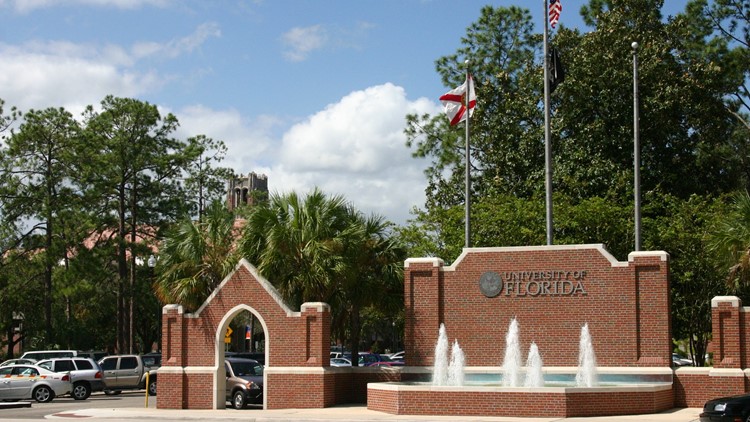GAINESVILLE, Fla. — Behind the walls of the University of Florida, faculty are feeling the pressure to stifle "unpopular viewpoints" and the fear of taking action that could upset the "current state governing party," a Faculty Senate Committee report shows.
The Faculty Senate Ad Hoc Committee on Academic Freedom was tasked with gathering information on the university's practices and reports that it restricted faculty's rights to academic freedoms and free speech.
Recently, UF has been the subject of headlines for initially prohibiting three professors from testifying on Florida's implementation of a voting restrictions law, and claims it wanted professors to remove words like "critical" and "race" from syllabi.
But the committee's report uncovered, according to faculty accounts, that even more restrictions were being implemented at UF. This time it had to do with COVID-19.
According to the report, the committee was informed of instances in which UF employees "were told verbally not to criticize the Governor of Florida or UF policies related to Covid-19 in media interactions."
They were also allegedly restricted from speaking out and providing op-ed pieces. When it came to written commentary, the report shows restrictions included faculty not being able to use their UF titles and UF affiliation.
"There is a palpable feeling of fear among tenured and non-tenured COM faculty of reprisal if they speak out on these issues," the report reads.
The committee also heard concerns that COM/UF health facility expansion funding in the state could be in jeopardy if the state administrative branch policy regarding pandemic regulations were not followed.
Other accounts provided to committee members outlined reported "inconsistencies in procedures" related to access to unidentified data, disposition of de-identified data, destruction of de-identified data, and publication of de-identified data.
Regarding the professors who were initially prohibited from testifying on Florida's implementation of a voting restrictions law, the committee found that all three professors have previously consulted on issues nationally and in Florida.
"This is the first time that UF has raised an objection to their outside activity in this regard. In fact, Smith’s previous outside work in this area was positively evaluated in his annual reviews," the report reads.
According to the committee, there is no explicit set of rules to guide decision-makers and appears to be at the discretion of the administration.
"On the face of it, based on the limited sample in this lawsuit, the only consistent factor is that in all these cases faculty were prevented or limited in their ability to participate in lawsuits in which the policies of the current executive administration were challenged in the courts," members wrote in the report.
Faculty also reported to the committee that Associate Provost Chris Hass, during a meeting to discuss new curricular initiatives around race and education, shared that UF administration "was under pressure to avoid doing anything that might provoke the legislature or governor to take a dim view of the University."
The report goes on to say that Hass suggested that the jobs of President Kent Fuchs and Provost Dr. Joseph Glover would be at risk if UF "moved forward with any activities out of favor with the current state governing party."
10 Tampa Bay reached out to the university for comment on the report:
"Thank you for the opportunity to respond but we have no further comment," a spokesperson wrote.
Overall, the committee found examples of pressure to stifle "unpopular" viewpoints and restrict research to be problematic.
"There was grave concern about retaliation and a sense that anyone who objected to the state of affairs might lose his or her job or be punished in some way. To a certain extent, faculty often engaged in self-censorship and chose not to 'rock the boat' for fear of retaliation," committee members wrote.
The report adds that it's clear that pressures to modify speech and conform to political pressures are coming from both the university's COI office and senior administration.
"We hope this report provides an opportunity to ultimately address these concerns and contribute to enhancing the integrity and mission of UF as a respected institution of higher learning so that the people of Florida will benefit from a world-class institution that they have paid so much to create and support and to which they are so deserving," the report reads.
It's important to note that the committee says it was under time constraints and lacked the resources to "fully investigate" the reports made to them from faculty and what legal or policy implications they could hold.



